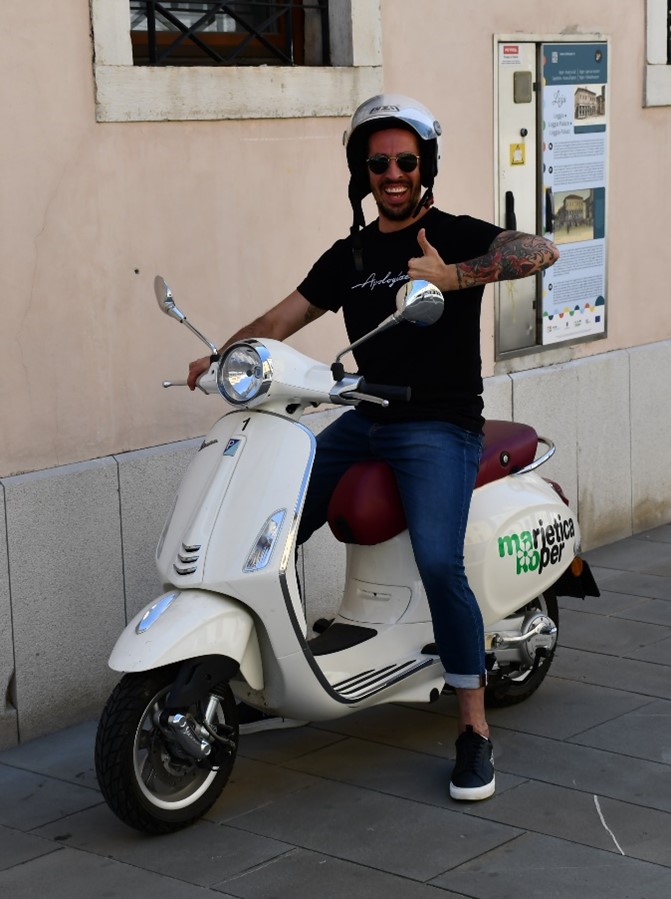All activities of the BalanCed project are environmentally oriented. In our workshops, we recycle use used items into something new. We know that the best waste is the one that is never made. At the same time, we cannot avoid waste. It is necessary to handle and separate the waste properly. We asked Marko Ugrin, representative for public relations at Marjetica Koper, how the people of Koper are successful in this, where this waste goes after it is dumped, and which activities are within the domain of Marjetica.
Marjetica Koper is mainly associated with waste removal, but your activities are much broader. What’s in your responsability?
At Marjetica Koper, we like to say that we have been taking care of almost everything public in the municipalities of Koper and Ankaran for more than 65 years. Our main activity, engaging approximately one third of all employees, is of course waste management. We also take care of waste water (sewage, sewage treatment plant septic tanks), funeral and burial activities, public parking and ports, advertising on poster sites and electronic screens, the city market place, the swimming pools in Koper and Žusterna, animal shelters of all four municipalities of Slovenian Istria, and we arrange green public areas (parks, roundabouts, paths). We are also proud of our Urban Gardening, functioning in Škocjan for almost 100 years.
I would like to focus mainly on waste within this interview, as we, the project BalanCed, are emphasising the importance of waste reduction and proper separation. How do Koper inhabitants separate waste?
They separate waste very differently. Some of us really conscientiously separate the waste, while others don’t really care and throw everything in the same bin. Considering that the percentage of properly separated waste is around 48%, we assume that we are divided in half. In general, we can summarize that separation is better for those households that have individual containers, but where there are common containers on ecological islands, the picture is much worse. Above all, we are saddened by the fact that ecological islands are becoming places for dumping bulky and construction waste. We assume some people expect us to take the bulky and construction waste together with other waste. We have two collection centres operating from Monday to Saturday, Centre Sermin even every day until 6 p.m., yet waste is still found everywhere in public areas. Dumping at collection centres is free for citizens of Koper and Ankaran, and they also have the option to order free pickup and drop-off twice a year.
Where does individual waste go after we throw them in containers?
At first we pick the waste separately using our trucks and bring them to the Sermin Collection Centre. From there they are brought to different places, according to the cathegory. The rest of the municipal waste (black bins) goes to the company Kostak Krško for processing (useful waste that remains mixed due to improper separation is also collected) and the rest is disposed of. The processing of the mixed waste represents the biggest cost for companies and, consequently, citizens. Mixed packaging (plastic, metal, tetrapack), paper and glass are taken over by various waste recycling companies, operating under the state concessions. Biological waste is sent to the composting plant in Šentilj in Slovenske gorice. We send out waste electrical and electronic equipment to companies that have the same concession from the state and they take care of processing only these. Hazardous waste mostly travels abroad for destruction.
How do you raise awareness of the citizens of proper waste separation?
We inform them about our free collection of various types of waste and waste management in general via the website, social networks and local media. We try to be present as much as possible at all public events in Koper, and during the school year we hold educational workshops at primary and secondary schools.
Finally, do you have any environmental message for all residents of Koper Municipality?
Our message is above all that we take care of our common environment with proper waste handling and separation. We are not doing this for Marjetica, nor for the mayor or prime minister. We do this for nature, for us, for our children or grandchildren. We want to improve the mindset that every individual can contribute to this. We inherited nature from our ancestors and we borrow it from our descendants, let’s think about what we will leave to them.
